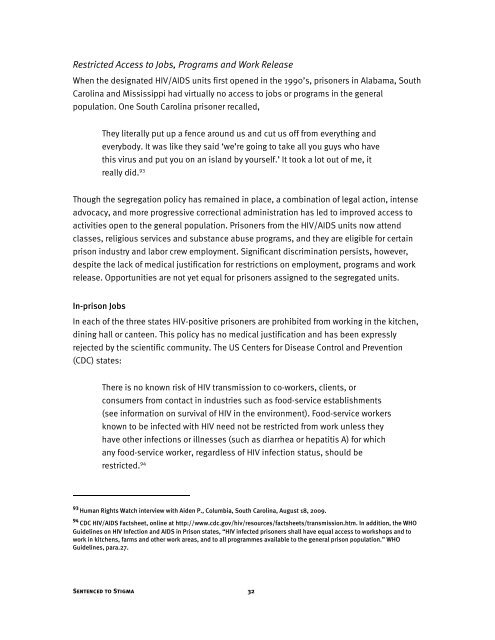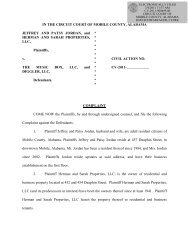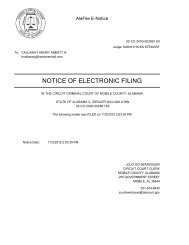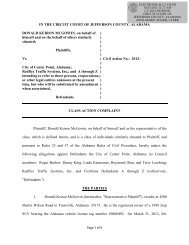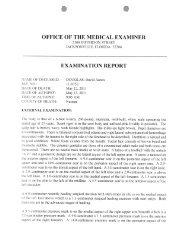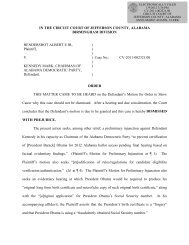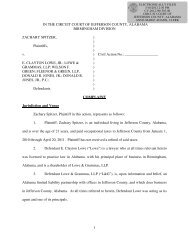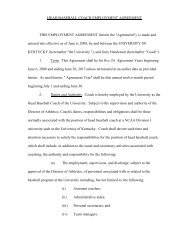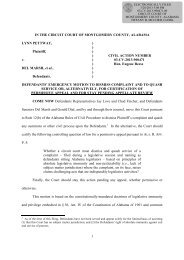Restricted Access <strong>to</strong> Jobs, Programs and Work ReleaseWhen the designated <strong>HIV</strong>/AIDS units first opened in the 1990’s, prisoners in Alabama, SouthCarolina and Mississippi had virtually no access <strong>to</strong> jobs or programs in the generalpopulation. One South Carolina prisoner recalled,They literally put up a fence around us and cut us <strong>of</strong>f from everything andeverybody. It was like they said ‘we’re going <strong>to</strong> take all you guys who havethis virus and put you on an island by yourself.’ It <strong>to</strong>ok a lot out <strong>of</strong> me, itreally did. 93Though the segregation policy has remained in place, a <strong>com</strong>bination <strong>of</strong> legal action, intenseadvocacy, and more progressive correctional administration has led <strong>to</strong> improved access <strong>to</strong>activities open <strong>to</strong> the general population. <strong>Prisoners</strong> from the <strong>HIV</strong>/AIDS units now attendclasses, religious services and substance abuse programs, and they are eligible for certainprison industry and labor crew employment. Significant discrimination persists, however,despite the lack <strong>of</strong> medical justification for restrictions on employment, programs and workrelease. Opportunities are not yet equal for prisoners assigned <strong>to</strong> the segregated units.In-prison JobsIn each <strong>of</strong> the three states <strong>HIV</strong>-positive prisoners are prohibited from working in the kitchen,dining hall or canteen. This policy has no medical justification and has been expresslyrejected by the scientific <strong>com</strong>munity. The US Centers for Disease Control and Prevention(CDC) states:There is no known risk <strong>of</strong> <strong>HIV</strong> transmission <strong>to</strong> co-workers, clients, orconsumers from contact in industries such as food-service establishments(see information on survival <strong>of</strong> <strong>HIV</strong> in the environment). Food-service workersknown <strong>to</strong> be infected with <strong>HIV</strong> need not be restricted from work unless theyhave other infections or illnesses (such as diarrhea or hepatitis A) for whichany food-service worker, regardless <strong>of</strong> <strong>HIV</strong> infection status, should berestricted. 9493 Human Rights Watch interview with Aiden P., Columbia, South Carolina, August 18, 2009.94 CDC <strong>HIV</strong>/AIDS Factsheet, online at http://www.cdc.gov/hiv/resources/factsheets/transmission.htm. In addition, the WHOGuidelines on <strong>HIV</strong> Infection and AIDS in Prison states, “<strong>HIV</strong> infected prisoners shall have equal access <strong>to</strong> workshops and <strong>to</strong>work in kitchens, farms and other work areas, and <strong>to</strong> all programmes available <strong>to</strong> the general prison population.” WHOGuidelines, para.27.<strong>Sentenced</strong> <strong>to</strong> <strong>Stigma</strong> 32
Particularly disturbing is Alabama and South Carolina’s admission that the policy has nomedical basis but defers <strong>to</strong> fear and prejudice that exists among the prisoner population. InAlabama, prison <strong>of</strong>ficials <strong>to</strong>ok a “survey” <strong>of</strong> prisoners in the Limes<strong>to</strong>ne facility and foundthat “80 percent <strong>of</strong> those polled were opposed <strong>to</strong> <strong>HIV</strong>-positive prisoners working in foodservice.” 95 Alabama <strong>of</strong>ficials <strong>to</strong>ld Human Rights Watch and the ACLU-NPP that the ban wasjustified because, they asserted, general population prisoners would not <strong>to</strong>lerate “openlygay” prisoners as food service workers, the assumption apparently being that prisoners with<strong>HIV</strong> must be “openly gay”. Human Rights Watch and the ACLU-NPP confirmed with Alabama<strong>of</strong>ficials that “openly gay” prisoners, regardless <strong>of</strong> <strong>HIV</strong> status, are also barred as a matter <strong>of</strong>policy from working in the kitchen. 96 This policy has serious human rights implications thatdemand further investigation.The approach <strong>to</strong> these issues by Alabama <strong>of</strong>ficials demonstrates how prejudice againstpersons with <strong>HIV</strong> is <strong>of</strong>ten inextricably linked with homophobia. Moreover, Alabama <strong>of</strong>ficialsconceded that but for the segregation policy that identifies <strong>HIV</strong>-positive prisoners <strong>to</strong> the res<strong>to</strong>f the population, prisoners living with <strong>HIV</strong> could work in the kitchen without incident. 97 Thusthe “security” problem is one created solely by the <strong>of</strong>ficials themselves by <strong>com</strong>pellinginvoluntary disclosure <strong>of</strong> prisoners’ <strong>HIV</strong> status <strong>to</strong> other prisoners.In South Carolina, the prison <strong>HIV</strong>/AIDS policy states on page 3, “No <strong>HIV</strong>/AIDS positiveprisoner shall be assigned <strong>to</strong> kitchen detail. The perceived risk <strong>of</strong> transmission by foodservice be<strong>com</strong>es a severe management problem.” Rather than addressing this erroneousperception, South Carolina has chosen <strong>to</strong> deny an entire category <strong>of</strong> in-prison employmen<strong>to</strong>n the basis <strong>of</strong> <strong>HIV</strong> status. Again, prison <strong>of</strong>ficials cite a “security” issue that arises only fromtheir own policy <strong>of</strong> segregation. Kitchen work can be beneficial <strong>to</strong> a prisoner in several ways.Many prisoners worked in kitchens, cafes, or restaurants prior <strong>to</strong> incarceration, andcontinued employment in that area could help them upon re-entry. Moreover, in manyprisons, including South Carolina, kitchen work <strong>of</strong>fers the opportunity <strong>to</strong> earn high amounts<strong>of</strong> “good time” credits as well as wages. As Bob C. explained, “if I could get a kitchen job Icould cut down my time a whole lot—I could get 10 months <strong>of</strong> good time as opposed <strong>to</strong> 4months with my job in the yard.” 9895 Letter <strong>to</strong> Human Rights Watch/ACLU-NPP and the ACLU <strong>of</strong> Alabama from Commissioner <strong>of</strong> Corrections Richard Allen datedMarch 12, 2010.96 Human Rights Watch/ACLU-NPP and ACLU <strong>of</strong> Alabama teleconference with Commissioner <strong>of</strong> Corrections Richard F. Allen ,Deputy Commissioner James LaRoach and staff, March 16, 2010.97 Human Rights Watch/ACLU-NPP and ACLU <strong>of</strong> Alabama teleconference with Commissioner <strong>of</strong> Corrections Richard F. Allen,Deputy Commissioner James LaRoach and staff, March 16, 2010.98 Human Rights Watch interview with Bob C.,Charles<strong>to</strong>n, South Carolina, August 21, 2009.33 April 2010


